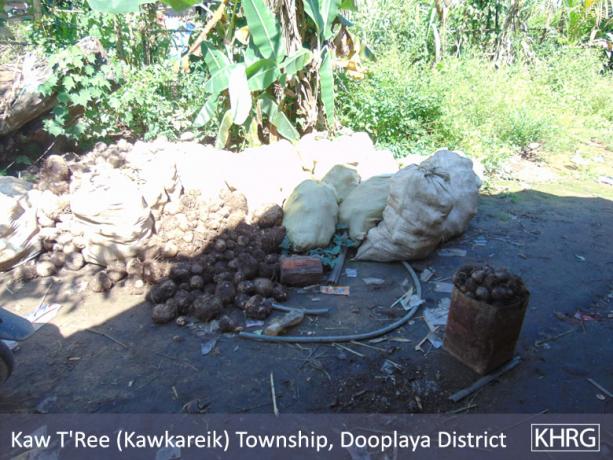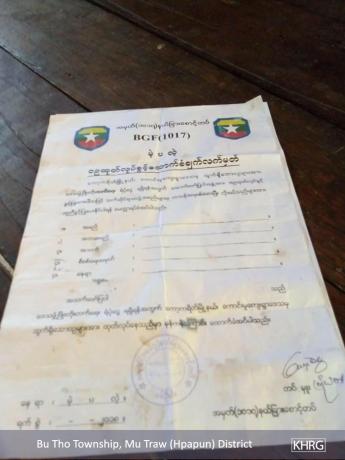In October 2018, the Border Guard Forces (BGF) trespassed into an area beyond their control to demand a tax from local community members. Their tax targeted a segment of the population who earn their living by gathering and selling elephant foot yams, and who often face livelihood challenges because they do not have agricultural lands of their own. In response, the local community reported the case to the Karen National Liberation Army (KNLA).
Short Update | Kawkareik Township, Dooplaya District (October 2018)
The following Short Update was received by KHRG in October 2018. It was written by a community member in Dooplaya District who has been trained by KHRG to monitor human rights conditions. It is presented below translated exactly as originally written, save for minor edits for clarity and security.[1]
On October 1 2018, the Commander of the BGF Battalion #1017 Saw Hsa Poh ordered two village heads from A--- and B--- villages, Naung Kaing village tract to meet him.[2] He requested this meeting to demand a tax from the local population that gathers and sells elephant foot yams, a vegetable used in local cuisine. [This segment of the community depends on this activity for their livelihoods, often because they do not have agricultural lands of their own].
The BGF Commander told the village heads that the taxes would be used for a community development fund. He requested a 500,000 kyats (US $315.70) tax for each five elephant foot yams cooked in the furnace in Naung Kaing village tract.[3] The BGF warned the village heads that local people would be arrested if they did not pay this tax. The village heads were afraid of the BGF Commander but managed to lower the tax down to 400,000 kyats (US $ 252.57).
The local community perceives that the BGF does not have the authority to levy this tax. Although the BGF gave them a tax receipt, it does not include a signature to show who received the money. The BGF only has permission to collect taxes from the Kaung Hmuh village area, not in Naung Kaing village tract.
The local community believes that the BGF is trespassing into an area outside of their control. Because the BGF is based in Brigade #7, they wrote a letter reporting this incident to the KNLA Operation Commander Major Saw Hpaw Doh based in Brigade #7.
Elephant foot yams are a staple of Karen cuisine. They are commonly found in the mountainous forests of Southern Myanmar and are at times cultivated by local communities.
[Photo: KHRG]
The tax received given by the BGF to the local villages who paid this tax. [Photo: KHRG]
Footnotes:
[1] KHRG trains community members in southeast Burma/Myanmar to document individual human rights abuses using a standardised reporting format; conduct interviews with other villagers; and write general updates on the situation in areas with which they are familiar. When writing situation updates, community members are encouraged to summarise recent events, raise issues that they consider to be important, and present their opinions or perspective on abuse and other local dynamics in their area.
[2] Border Guard Force (BGF) battalions of the Tatmadaw were established in 2010, and they are composed mostly of soldiers from former non-state armed groups, such as older constellations of the DKBA, which have formalised ceasefire agreements with the Burma/Myanmar government. The BGF battalion #1017 led by Battalion Commander Saw Hsa Hpoh is based in Kaung Hmuh Camp, Yan Kote village, Yan Kote village tract, Kawkareik Township, .
[3] All conversion estimates for the kyat in this report are based on the November 28, 2018 official market rate of 1,583 kyats to US $1.


